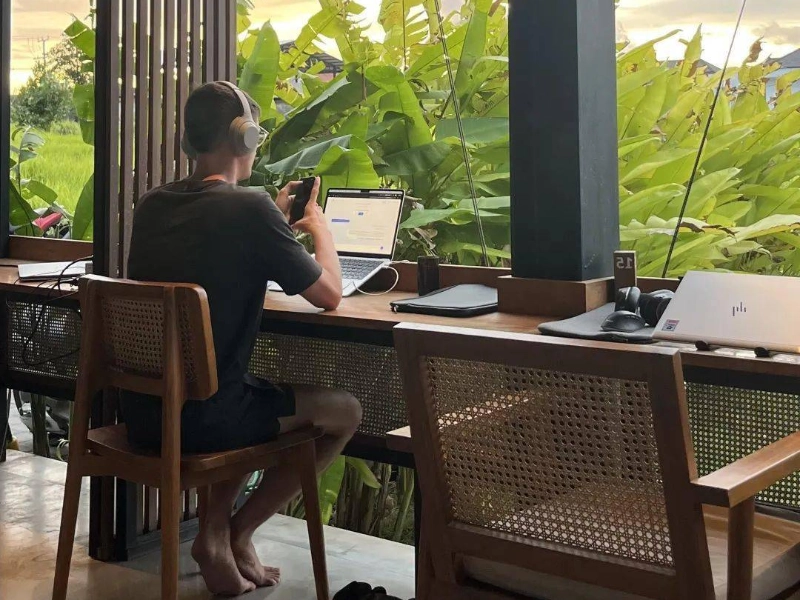Digital Nomad Dreams: How Online Jobs Are Changing Work Culture
Among the expanding number of remote workers are digital nomads. These individuals may work remotely for an organization or as independent contractors or business owners. These people work from home or in other remote areas and lead nomadic lifestyles, roaming the world. Is it really as glitzy as it appears?
1. Adaptability

2. Journey
 The worldwide work-from-home lifestyle blends travel and discovery with career goals. However, there are drawbacks to a career as a digital nomad as well as advantages.
Keeping up the lifestyle necessitates extensive planning. A digital nomad has to downsize their belongings, make a budget that works for their new lifestyle, and declutter both physically and digitally before they move out of their house. They also need to familiarize themselves with the nation they will be visiting, particularly its regulations regarding visas and Internet access.
Apart from the technical aspects, digital nomads also need to think about how their way of life will affect the areas they live in. Overtourism is already a problem in some areas. Locals have accused others of being crude in their cultural beliefs. The best defense against this kind of unfavorable impression is to concentrate on sincere, mutually beneficial relationships with other remote workers.
The worldwide work-from-home lifestyle blends travel and discovery with career goals. However, there are drawbacks to a career as a digital nomad as well as advantages.
Keeping up the lifestyle necessitates extensive planning. A digital nomad has to downsize their belongings, make a budget that works for their new lifestyle, and declutter both physically and digitally before they move out of their house. They also need to familiarize themselves with the nation they will be visiting, particularly its regulations regarding visas and Internet access.
Apart from the technical aspects, digital nomads also need to think about how their way of life will affect the areas they live in. Overtourism is already a problem in some areas. Locals have accused others of being crude in their cultural beliefs. The best defense against this kind of unfavorable impression is to concentrate on sincere, mutually beneficial relationships with other remote workers.
3. Customs
 The new wave of influential people are the digital nomads, who work from anywhere—from a tent on the beach to their parent's extra room. However, many digital nomads still have to work full-time jobs when they're on the road, despite their freedom.
But there are drawbacks to this surge of wanderlust. Since they enjoy benefits and a high income that other workers do not, many of these nomads are able to roam.
The rising gap between American expats and Madeira residents is evidence that others have also discovered themselves in conflict with locals in their chosen places. Some claim that the cult of a nomadic lifestyle can be harmful in terms of racism, xenophobia, and misogyny. It may also represent a deceptive image of comfortable travel for those who do not deserve it.
The new wave of influential people are the digital nomads, who work from anywhere—from a tent on the beach to their parent's extra room. However, many digital nomads still have to work full-time jobs when they're on the road, despite their freedom.
But there are drawbacks to this surge of wanderlust. Since they enjoy benefits and a high income that other workers do not, many of these nomads are able to roam.
The rising gap between American expats and Madeira residents is evidence that others have also discovered themselves in conflict with locals in their chosen places. Some claim that the cult of a nomadic lifestyle can be harmful in terms of racism, xenophobia, and misogyny. It may also represent a deceptive image of comfortable travel for those who do not deserve it.
4. Establishing connections
 For digital nomads, the perfect balance between work and natural wanderlust is essential. But regardless of the time zone or location, a life of remote work necessitates a robust network for success and a well-defined plan for managing professional responsibilities.
This entails building and keeping up a portfolio of your own work, including affiliate marketing, virtual help, e-commerce, and online tuition. It also necessitates guaranteeing excellent technical proficiency and building strong client communication channels.
To ensure that your money goes as far as possible, budget wisely as well. A defined timetable also helps define when you're on call for specific jobs, like customer service, so colleagues don't wake you up at two in the morning for an important meeting. Don't forget to include a professionally made business card!
For digital nomads, the perfect balance between work and natural wanderlust is essential. But regardless of the time zone or location, a life of remote work necessitates a robust network for success and a well-defined plan for managing professional responsibilities.
This entails building and keeping up a portfolio of your own work, including affiliate marketing, virtual help, e-commerce, and online tuition. It also necessitates guaranteeing excellent technical proficiency and building strong client communication channels.
To ensure that your money goes as far as possible, budget wisely as well. A defined timetable also helps define when you're on call for specific jobs, like customer service, so colleagues don't wake you up at two in the morning for an important meeting. Don't forget to include a professionally made business card!
5. Adaptability
 Everyone who enjoys balancing work and travel will find the lifestyle appealing. It enables individuals to fully engage with diverse cultures, transforming their career goals and personal passions into an unending journey.
Before making the move, it's crucial to understand what digital nomadism truly means. A digital nomad is a person who works remotely but travels a lot—possibly even full-time. They may work in lively coffee shops or calm co-working facilities that encourage efficiency.
The keys to this kind of flexibility include online careers in industries like affiliate marketing, digital product development, telemarketing, virtual assistance, e-commerce, and online tutoring. Younger generations are becoming more and more interested in these employment possibilities since they provide the chance to earn money without being restricted to a certain area.
Everyone who enjoys balancing work and travel will find the lifestyle appealing. It enables individuals to fully engage with diverse cultures, transforming their career goals and personal passions into an unending journey.
Before making the move, it's crucial to understand what digital nomadism truly means. A digital nomad is a person who works remotely but travels a lot—possibly even full-time. They may work in lively coffee shops or calm co-working facilities that encourage efficiency.
The keys to this kind of flexibility include online careers in industries like affiliate marketing, digital product development, telemarketing, virtual assistance, e-commerce, and online tutoring. Younger generations are becoming more and more interested in these employment possibilities since they provide the chance to earn money without being restricted to a certain area.








